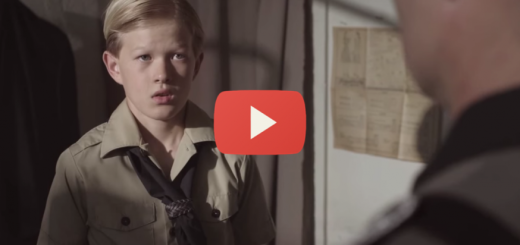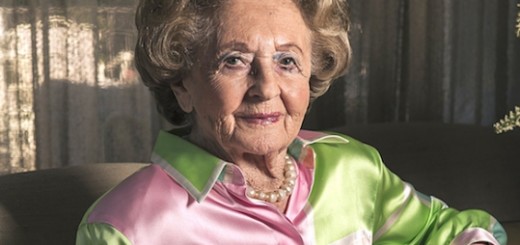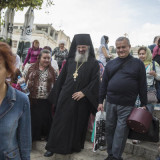SURIVOR: BETTY HYATT
“Mommy, mommy.” Five-year-old Betty Hyatt, then Betty Prins, frightened by the unfamiliar low, rumbling noises in the sky, jumped out of bed and ran screaming for her mother. It was early morning on Friday, May 10, 1940, the day she and her father were planning to travel to Holland to visit relatives. Instead, Betty and her family sought shelter as planes flew low overhead in formation, dropping bombs on Antwerp. “I was terrified,” recalled Betty, who had never before seen an airplane.
 Betty was born in Antwerp, Belgium, on Dec. 16, 1934, to Esther and Nathaniel Prins. Her brother, Fred, was born in November 1939.
Betty was born in Antwerp, Belgium, on Dec. 16, 1934, to Esther and Nathaniel Prins. Her brother, Fred, was born in November 1939.
Betty’s father built and operated a factory for machine embroidery, employing 30 workers. It was located behind the family’s house in Borgerhout, an Antwerp suburb.
The business was successful, and Betty lived a privileged life with a nanny and vacations at beach resorts. She briefly attended private school before the war broke out.
After Belgium was attacked, Betty’s father contacted the Dutch consulate and arranged for passports to Surinam, a Dutch colony in South America. To get there, the family needed to pick up visas in Marseilles and then board a ship in Portugal.
Betty’s parents closed the house, gave Betty’s dog to a neighbor and left in their “big, monstrous-looking Packard,” according to Betty. The road was crowded with other evacuees, many walking with bundles, pushcarts and donkeys.
After crossing into northern France, they stopped at a Red Cross refugee camp. Betty’s father then returned to Antwerp for Betty’s mother’s parents, her mother’s sister and the sister’s fiancé.
The first day out with all eight family members, the car was sideswiped and sent tumbling over an embankment, rolling over several times. No one was hurt, but a tire was destroyed. It took three days to locate a replacement.
The family then drove to Reims, stopping for the night in a church converted to a refugee camp. Before daybreak, Betty’s father arose and insisted, against other family members’ wishes and for no apparent reason, they leave immediately. They were barely five minutes away when they heard a loud explosion. The church had been bombed and, they later learned, 500 were people killed.
The family eventually stopped in the village of Saint-Sauveur-en-Rue, where they lived in an abandoned hut. Betty attended school, learning French fluently. She befriended a golden retriever, naming her Mirette. The dog came to live with the family and subsequently gave birth to 12 puppies. Local farmers, needing guard dogs to fend off looters, bartered milk, eggs, butter and bread for them.
Seven months later, the family left, giving Mirette to a farmer. On the day they departed, Mirette howled inconsolably, and Betty cried until she fell asleep. “It was a terrible loss,” Betty said.
After many months and many stops, the family arrived in Marseilles. But it was Vichy France, and as Jews and non-French, they were unable to travel any farther. Plus, having run out of money, Betty’s father was forced to sell the car.
The Dutch consul suggested they go to Lamastre, a nearby village, where Betty’s father found a job as a janitor. Betty and her family lived in a second-floor flat with no water.
As foreigners, Betty’s family was required to report to the police station weekly. One week, however, Betty’s grandfather inadvertently revealed to the police that the family was Jewish.
A few nights later, a woman dressed in black knocked at Betty’s parents’ flat. “Do not be afraid,” she said. “I work with the maquis (the French resistance).” She told them that the Germans were planning to round up young people and deport them to Germany to work.
Betty’s aunt and fiancé decided to flee, heading to Portugal on foot. The resistance arranged false papers and employment for Betty’s father, relocating him near the Pyrenees. But he was betrayed for working as a Frenchman, arrested and later, on Jan. 31, 1943, transported to the Drancy transit camp outside Paris.
Less than a month later, Betty’s grandfather was picked up in Lamastre and also sent to Drancy. Betty discovered after the war that he died en route.
Soon after, learning that the Germans were rounding up women and children, resistance members took Betty and Fred by bicycle in the middle of the night to a farmer’s house, where they were united with their mother and grandmother. After a short stay, the family found an abandoned stable in the higher regions of Ardèche, in south-central France.
There was no furniture, and they filled bags with hay to use as beds. Betty remembers lice and bed bugs as well as huge rats that ate the chestnuts they gathered.
Betty’s mother joined the French resistance in the nearby town of Gilhoc-sur-Ormèze, taking Betty with her to meetings. Betty became a child courier, alerting local farmers to light bonfires designating safe landing places for Allied special forces being parachuted in.
At those meetings, Eugénie Brunel, a midwife and resistance member, took a liking to Betty and offered to give her a home. Betty’s mother handed her over on the spot. “At that very moment the bond between my mother and me was broken,” recalled Betty, who was 8 at the time.
Betty lived under the false name of Berta Lambert. She attended school whenever possible and worked for the resistance as needed. Occasionally she walked uphill to visit her family. “Eugénie was a magnificent woman,” according to Betty, who later nominated her for Yad Vashem’s “Righteous Among the Nations” designation, which was granted in 1981.
The war ended in France in August 1944, and a few months later Betty returned with her mother, grandmother and brother to Lamastre. Betty’s mother subsequently suffered a nervous breakdown, and in 1945, Betty and Fred were sent to a displaced persons camp for children in central France.
They were later put in another camp for children in northern Belgium, but then found themselves living with their mother and grandmother in a run-down apartment in Brussels.
One day, Betty’s mother announced that she had remarried. “My father. My father,” Betty screamed. Her mother told her that he had died in a concentration camp, but Betty didn’t want to believe her. “It was unbearable,” Betty said. Years later, she learned that her father had been shot in Auschwitz by an SS soldier the day before the camp was liberated.
The family moved back to Antwerp, but Betty and Fred were again put in a displaced persons camp. Then Betty’s mother’s brother, who had gone to New York before the war, returned for the family. They arrived in the United States on Sept. 17, 1946.
Betty was enrolled in several schools in New York, but with no foundation and poor English skills, school was very difficult. Eventually she attended Forest Hills High School in Queens, where a teacher befriended her and introduced her to arts and literature. “When that happened, I had something to live for,” Betty said.
Betty met her future husband, Fred Hyatt, in the standing-room section of the Metropolitan Opera, and they married in 1955. They moved to Los Angeles a year later and had two sons: William, born in 1957, and Kenneth in 1961.
In 1972, Betty began working for the State of California. She retired as a foster care licensing program analyst in 1996.
Today, Betty, 78, works as a docent at the J. Paul Getty Museum and speaks at the Los Angeles Museum of the Holocaust. She also enjoys visiting with her sons, daughters-in-law and two grandsons.
“Everything that happened in my life is sheer luck,” she said.
***We know that, only thanks to God, people survived the Holocaust***










